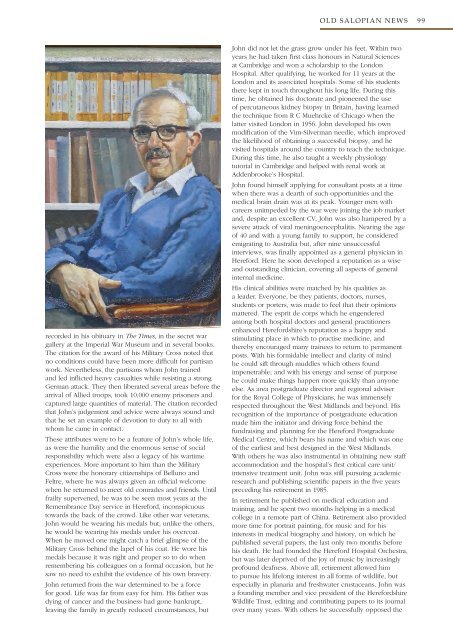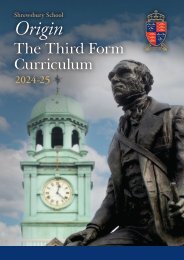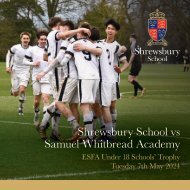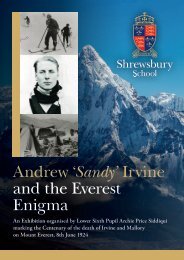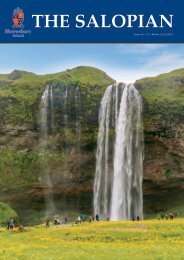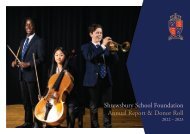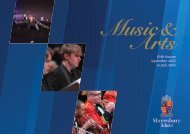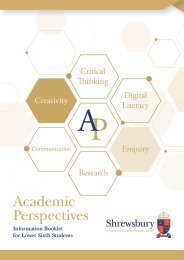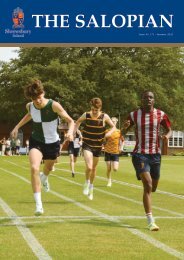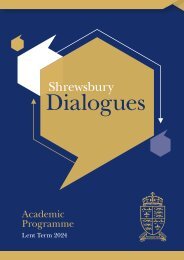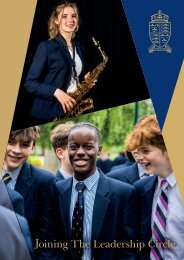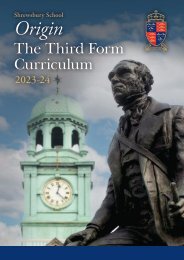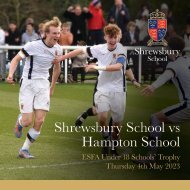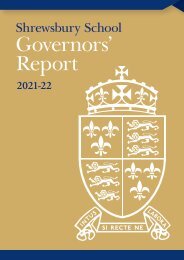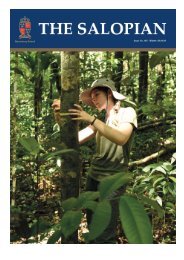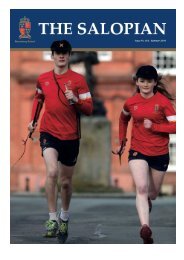The Salopian no. 160 - Summer 2017
- No tags were found...
You also want an ePaper? Increase the reach of your titles
YUMPU automatically turns print PDFs into web optimized ePapers that Google loves.
OLD SALOPIAN NEWS 99<br />
recorded in his obituary in <strong>The</strong> Times, in the secret war<br />
gallery at the Imperial War Museum and in several books.<br />
<strong>The</strong> citation for the award of his Military Cross <strong>no</strong>ted that<br />
<strong>no</strong> conditions could have been more difficult for partisan<br />
work. Nevertheless, the partisans whom John trained<br />
and led inflicted heavy casualties while resisting a strong<br />
German attack. <strong>The</strong>y then liberated several areas before the<br />
arrival of Allied troops, took 10,000 enemy prisoners and<br />
captured large quantities of material. <strong>The</strong> citation recorded<br />
that John’s judgement and advice were always sound and<br />
that he set an example of devotion to duty to all with<br />
whom he came in contact.<br />
<strong>The</strong>se attributes were to be a feature of John’s whole life,<br />
as were the humility and the e<strong>no</strong>rmous sense of social<br />
responsibility which were also a legacy of his wartime<br />
experiences. More important to him than the Military<br />
Cross were the ho<strong>no</strong>rary citizenships of Bellu<strong>no</strong> and<br />
Feltre, where he was always given an official welcome<br />
when he returned to meet old comrades and friends. Until<br />
frailty supervened, he was to be seen most years at the<br />
Remembrance Day service in Hereford, inconspicuous<br />
towards the back of the crowd. Like other war veterans,<br />
John would be wearing his medals but, unlike the others,<br />
he would be wearing his medals under his overcoat.<br />
When he moved one might catch a brief glimpse of the<br />
Military Cross behind the lapel of his coat. He wore his<br />
medals because it was right and proper so to do when<br />
remembering his colleagues on a formal occasion, but he<br />
saw <strong>no</strong> need to exhibit the evidence of his own bravery.<br />
John returned from the war determined to be a force<br />
for good. Life was far from easy for him. His father was<br />
dying of cancer and the business had gone bankrupt,<br />
leaving the family in greatly reduced circumstances, but<br />
John did <strong>no</strong>t let the grass grow under his feet. Within two<br />
years he had taken first class ho<strong>no</strong>urs in Natural Sciences<br />
at Cambridge and won a scholarship to the London<br />
Hospital. After qualifying, he worked for 11 years at the<br />
London and its associated hospitals. Some of his students<br />
there kept in touch throughout his long life. During this<br />
time, he obtained his doctorate and pioneered the use<br />
of percutaneous kidney biopsy in Britain, having learned<br />
the technique from R C Muehrcke of Chicago when the<br />
latter visited London in 1956. John developed his own<br />
modification of the Vim-Silverman needle, which improved<br />
the likelihood of obtaining a successful biopsy, and he<br />
visited hospitals around the country to teach the technique.<br />
During this time, he also taught a weekly physiology<br />
tutorial in Cambridge and helped with renal work at<br />
Addenbrooke’s Hospital.<br />
John found himself applying for consultant posts at a time<br />
when there was a dearth of such opportunities and the<br />
medical brain drain was at its peak. Younger men with<br />
careers unimpeded by the war were joining the job market<br />
and, despite an excellent CV, John was also hampered by a<br />
severe attack of viral meningoencephalitis. Nearing the age<br />
of 40 and with a young family to support, he considered<br />
emigrating to Australia but, after nine unsuccessful<br />
interviews, was finally appointed as a general physician in<br />
Hereford. Here he soon developed a reputation as a wise<br />
and outstanding clinician, covering all aspects of general<br />
internal medicine.<br />
His clinical abilities were matched by his qualities as<br />
a leader. Everyone, be they patients, doctors, nurses,<br />
students or porters, was made to feel that their opinions<br />
mattered. <strong>The</strong> esprit de corps which he engendered<br />
among both hospital doctors and general practitioners<br />
enhanced Herefordshire’s reputation as a happy and<br />
stimulating place in which to practise medicine, and<br />
thereby encouraged many trainees to return to permanent<br />
posts. With his formidable intellect and clarity of mind<br />
he could sift through muddles which others found<br />
impenetrable; and with his energy and sense of purpose<br />
he could make things happen more quickly than anyone<br />
else. As area postgraduate director and regional adviser<br />
for the Royal College of Physicians, he was immensely<br />
respected throughout the West Midlands and beyond. His<br />
recognition of the importance of postgraduate education<br />
made him the initiator and driving force behind the<br />
fundraising and planning for the Hereford Postgraduate<br />
Medical Centre, which bears his name and which was one<br />
of the earliest and best designed in the West Midlands.<br />
With others he was also instrumental in obtaining new staff<br />
accommodation and the hospital’s first critical care unit/<br />
intensive treatment unit. John was still pursuing academic<br />
research and publishing scientific papers in the five years<br />
preceding his retirement in 1985.<br />
In retirement he published on medical education and<br />
training, and he spent two months helping in a medical<br />
college in a remote part of China. Retirement also provided<br />
more time for portrait painting, for music and for his<br />
interests in medical biography and history, on which he<br />
published several papers, the last only two months before<br />
his death. He had founded the Hereford Hospital Orchestra,<br />
but was later deprived of the joy of music by increasingly<br />
profound deafness. Above all, retirement allowed him<br />
to pursue his lifelong interest in all forms of wildlife, but<br />
especially in planaria and freshwater crustaceans. John was<br />
a founding member and vice president of the Herefordshire<br />
Wildlife Trust, editing and contributing papers to its journal<br />
over many years. With others he successfully opposed the


